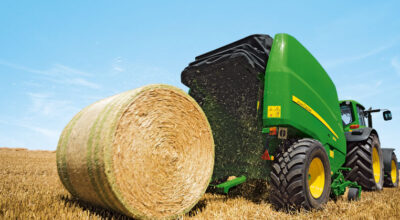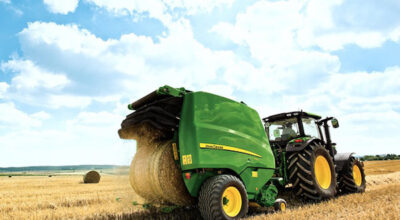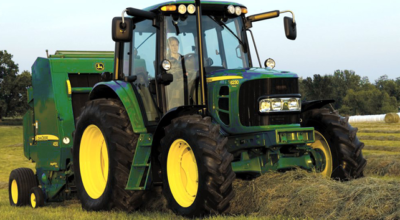Balers are best known for compacting hay and straw, but they have many other uses, too. More farmers, landscapers, and property owners are finding innovative ways to use these versatile machines, from bundling leaves for compost to packaging pine needles for mulch. These alternative applications help reduce waste, improve operational efficiency, and increase the return on investment for baling equipment.

If you’re looking for ways to expand your baler’s potential, here are some practical and effective uses to consider.
1. Baling Leaves for Compost and Bedding
In fall, leaves accumulate in fields, yards, and along roadsides, often ending up in burn piles or landfills. Composting is a sustainable alternative, but loose piles take up space and decompose unevenly. Baling leaves creates compact bundles that are easier to store and manage while breaking down at a steady rate. Dried leaf bales can also serve as soft, absorbent livestock bedding.
2. Pine Straw Baling for Landscaping Mulch
Pine needles, commonly known as pine straw, are a sought-after mulch in landscaping because they naturally retain moisture, suppress weeds, and improve soil health. However, loose pine straw is difficult to collect, transport, and store in bulk.
By baling pine straw, you can create compact, easy-to-handle bundles that are easier to manage. Landscapers, garden centers, and property owners prefer baled pine straw because it stays intact longer, reducing material loss during transport and application.
3. Compact Wheat Straw Bales for Garden Mulch and Bedding
Wheat straw, a byproduct of grain harvests, is often left in fields, but baling it creates valuable products for farming and gardening. When used as mulch, wheat straw protects delicate plants from extreme temperatures, conserves soil moisture, and prevents weeds from taking over.
In livestock care, wheat straw is a widely used bedding material, especially for poultry and small animals. Baled wheat straw is cleaner and easier to transport than loose straw, allowing farmers to store large quantities without worrying about spoilage or mess. Repurposing wheat straw into compact bales also ensures that leftover material is put to good use instead of going to waste.
Other Emerging Applications of Balers
Beyond farming and landscaping, balers are being used in industries that require efficient material handling:
Recycling Cardboard and Paper Waste
Retail stores, warehouses and other businesses that generate large quantities of cardboard and paper waste may use balers to compress these materials into dense, stackable bales. This makes it easier to store, transport, and send to recycling facilities while keeping work areas free of bulky waste.
Baling Corn Stalks for Biofuel Production
After harvest, farmers can bale corn stalks and transport them to biomass processing facilities, where they are converted into renewable energy sources like biofuel. This provides an efficient way to repurpose crop residue while supporting sustainable energy initiatives.
Compressing Industrial Byproducts
Industries that handle bulk materials like textiles, plastic wrap, and foam use balers to compact these materials for storage and shipping. This reduces clutter and improves efficiency in warehouses and manufacturing facilities.
Maximizing Equipment Potential
Finding new ways to use your baler can help reduce waste, improve efficiency, and maximize the value of your equipment. Whether you’re baling leaves for compost, packaging pine straw for mulch, or repurposing wheat straw, these applications ensure that your baler is being used to its full potential.
To learn more about baling solutions or to find the right equipment for your operation, visit our dealer locator and connect with a certified John Deere dealer today.



